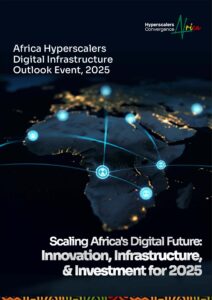It’s a no-brainer that global enterprises and startups require unhindered data flow that transcends geography with agility and speed. This is why companies like Africa Data Center (ADC), which boasts of the largest network of interconnected data centers in Africa, strive to maintain a stable and dependable IT infrastructure to cater to the enormous demand in Africa.
Over an email conversation with Dr Krishnan Ranganath, Regional Executive, West Africa at Africa Data Center, spoke about ADC’s interconnected data centers and how they can provide the essential infrastructure for startups to build and host their applications
What role do hyperscale data centers play in supporting Nigeria’s growing startup ecosystem?
While the major hyperscale deployments are yet to fully materialise in Africa, all key players in the industry have established facilities across the continent. The Nigerian Data Centre industry is still in its growth phase, and we anticipate significant deployments by predominant operators soon.
Both hyperscale data centres and enterprise data centres play crucial roles in boosting the local economy and supporting the startup ecosystem. By promoting data localisation through these data centres, we can foster greater data sovereignty and contribute to the development of local businesses and innovation. It’s essential to continue pushing for data localisation efforts to realise these benefits fully.
What specific advantages do hyperscale data centers offer to startups and emerging businesses seeking to scale their operations within and beyond Nigeria’s borders?
In the current Nigerian scenario, existing data centres offer potential support to startups. However, there’s still a tendency for people to opt for international cloud offerings and pay in USD. Changing this mindset is a gradual process that requires perseverance and a positive outlook. Despite this challenge, there’s a clear need for more capacity, particularly for hyperscale customers. Major data centre providers are actively working on expanding their capacities to meet this demand.
The arrival of hyperscale customers in these markets will not only address the capacity shortage but also catalyse the creation of an ancillary ecosystem around the primary one. This ecosystem extends from Nigeria to West Africa and beyond, following a natural expansion curve. As this expansion unfolds, it presents opportunities for further growth and development within the African data centre industry. Therefore, maintaining a positive mindset and continuing to adapt to market demands are crucial for driving progress in this space.
How does Africa Data Centres contribute to maintaining stable and dependable IT infrastructure, particularly in facilitating unhindered data flow for global enterprises operating in Nigeria?
Africa Data Centres is committed to providing exceptional availability to its clients. Achieving a 99.99999% uptime guarantee translates to downtime of no more than 26.3 seconds in a month, ensuring uninterrupted service for clients. This level of availability sets ADC apart in the industry.
Moreover, obtaining all major ISO certifications and the TIA 942 certification underscores the high standard of service offered by ADC. These certifications assure clients of the reliability and quality of the services provided.
Regarding power infrastructure, it’s reassuring to know that ADC operates on a high availability gas-based Independent Power Producer (IPP) within Eko Atlantic City. Supported by backup diesel generators and multiple fiber routes, ADC’s power infrastructure aligns with global data centre standards. Regular upgrades further ensure the reliability and resilience of the power supply, reinforcing ADC’s commitment to providing top-tier services to its clients.
With the increasing digitization of industries, how crucial is it for Nigerian startups to have access to reliable data infrastructure, and how does ADC address this need?
As I often emphasise, our data centres both within the country and across the continent serve as our backbone. It’s imperative that African data remains here, without question. We’re firmly committed to this path of progress.
When we consider Nigeria, the data centre ecosystem has witnessed substantial growth and continues to expand. We anticipate even more exponential growth in the years ahead. At ADC, we consistently champion startups and innovations. We must bolster our nation and the continent as a whole. As a pan-African player, we adopt a similar approach in other countries where we operate, ensuring continuity across our operations.
In what ways do hyperscale data centers foster innovation and collaboration within Nigeria’s startup ecosystem, and how does ADC support these initiatives?
We consistently back our startup ecosystem, adhering to our motto “Empowering Africa through excellence.” Being a connected data centre ecosystem in Africa greatly benefits our tech startups. Our cutting-edge data centres are constructed to meet global standards, offering the highest levels of availability—a crucial requirement for any startup. We provide this global infrastructure right here in Lagos. Our commitment remains steadfast to serving our people and the industry at large.
As Nigeria continues to attract foreign investment and multinational corporations, what role does ADC play in ensuring seamless data management and compliance with international standards?
As you’re aware, we operate as a pan-African data centre service provider, and Nigeria holds a significant position in our market strategy. The recent market developments have seen a surge in sizable foreign direct investments (FDIs) into Nigeria, underscoring the growing importance of the ICT sector, which serves as the backbone of any business. Ultimately, it falls upon data centres to deliver these critical services.
At ADC, we pride ourselves on holding all major ISO certifications, along with PCI DSS and TIA 942 certifications. Moreover, we offer our customers an SLA of 99.99999%, which represents the highest standards at the global level. This level of reliability is essential for both local enterprises and global hyperscalers, and it’s something we consistently provide across all our locations.
In addition, we maintain a dedicated team focused on adhering to both global compliances and local regulations. This approach is imperative in our industry, as compliance is non-negotiable, as you’re undoubtedly aware.
How do you envision the future of hyperscale data centers in Nigeria and their impact on the country’s overall digital transformation and economic growth?
The ICT sector made a significant contribution of 17.47% to Nigeria’s GDP in the first quarter of 2023, as reported by the NBS. These numbers continue to rise as the sector experiences rapid growth. Recent reports indicate that the sector grew by 8.6% year-on-year in the second quarter (Q2) of 2023, marking the highest growth rate in three years. It’s evident that data centres play a crucial role in driving this growth.
To put it into perspective, the data centre market received approximately a billion dollars in investment by the end of Q3 last year. Given that data centres are capital-intensive projects, these investments directly contribute to the expansion of our economy and industries, as well as the creation of employment opportunities.





